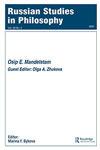A “Return” to the Traditions of Philosophical Logic (Sixteenth to Early Nineteenth Centuries): A Return or a Transformation?
IF 0.1
4区 哲学
Q4 Arts and Humanities
引用次数: 0
Abstract
ABSTRACT This section reproduces the part of Bibler’s book Thinking as Creative Work (1975) that discusses the subject as a “microsocium” combining the rational intellect, reason, intelligence, and intuition. All of these were contained in and disappeared into thinking but were logically sensed as a combination of different logics. The philosopher’s task in relation to the human intellect was to realize and reproduce the interaction of these abilities into a unified action. Later in the book From the Doctrine of Science to the Logic of Culture (1991), Bibler analyzed Nicholas of Cusa’s logic in detail, where the intellect reconstructs all other cognitive abilities and endows them with historically inimitable content. Nicholas of Cusa calls logic a purely rational movement for freeing the power of the mind for properly logical transformations, ultimately linking the mind with ignorance. Later this section discusses the features of ancient, Renaissance, and early modern-era thought by turning to Descartes, Leibniz, and Spinoza, in whose works the logical acquired a psychological justification. It was replaced by the logic of science, an analysis of which leads to the conviction that the advent of a new logic of culture is needed. Bibler shows that the logical intent of the Modern Philosophy was to order all of the previous logics into a continuous chain, which was justified by the very method of constructing scientific knowledge; logic thus became epistemology. Hegel was able to destroy all of the diversity of human abilities, incredibly expanding rational mind by introducing all of the definitions of cognition into it, but in the end it burst, revealing its truth as the truth of a holistic, dialectical reason. The development of a logic of structure, a logic of text, was a necessary process, but now we are addressing the ability to logically reproduce the predefinition of future logical systems. Now the logical development of the logic of text (formal logic) allows us to return to the potencies of philosophical logic of the seventeenth to nineteenth centuries and its radical transformation. This was outlined by Marx in his early writings and in his preparatory work for Capital. It became necessary and possible to master the internal logical dialogue developed by the modern era’s thought and to express it in the new logic, the logic of culture.哲学逻辑传统的“回归”(16世纪至19世纪初):回归还是转型?
本节复制了Bibler的书《Thinking as Creative Work》(1975)中的部分内容,该部分讨论了将理性智力、理性、智力和直觉结合在一起的“微社会”主题。所有这些都包含在思维中,又消失在思维中,但在逻辑上被感觉为不同逻辑的组合。哲学家对于人类智力的任务是实现并再现这些能力的相互作用,使之成为统一的行动。后来,比布勒在1991年出版的《从科学学说到文化逻辑》一书中详细分析了尼古拉斯·库萨的逻辑,其中智力重构了所有其他认知能力,并赋予它们历史上不可模仿的内容。库萨的尼古拉斯称逻辑是一种纯粹的理性运动,它释放了思想的力量,进行适当的逻辑转换,最终将思想与无知联系起来。稍后,本节将通过笛卡尔、莱布尼茨和斯宾诺莎来讨论古代、文艺复兴和早期现代思想的特点,在他们的作品中,逻辑获得了心理学上的正当性。它被科学逻辑所取代,对科学逻辑的分析使我们确信,需要一种新的文化逻辑的出现。比伯勒指出,现代哲学的逻辑意图是要把以前的一切逻辑排列成一条连续的链条,而这正是构造科学知识的方法所证明的;于是逻辑学变成了认识论。黑格尔能够摧毁人类能力的多样性,通过引入认知的所有定义,令人难以置信地扩展理性思维,但最终它爆发了,揭示了它作为整体辩证理性的真理。结构逻辑、文本逻辑的发展是一个必要的过程,但现在我们要解决的是逻辑上再现未来逻辑系统的预定义的能力。现在,文本逻辑(形式逻辑)的逻辑发展使我们能够回到17到19世纪哲学逻辑的力量及其根本性的转变。马克思在他的早期著作和《资本论》的准备工作中概述了这一点。掌握现代思想发展起来的内在逻辑对话,用新的逻辑——文化逻辑来表达,就变得必要和可能。
本文章由计算机程序翻译,如有差异,请以英文原文为准。
求助全文
约1分钟内获得全文
求助全文
来源期刊

RUSSIAN STUDIES IN PHILOSOPHY
PHILOSOPHY-
CiteScore
0.10
自引率
0.00%
发文量
14
期刊介绍:
Russian Studies in Philosophy publishes thematic issues featuring selected scholarly papers from conferences and joint research projects as well as from the leading Russian-language journals in philosophy. Thematic coverage ranges over significant theoretical topics as well as topics in the history of philosophy, both European and Russian, including issues focused on institutions, schools, and figures such as Bakhtin, Fedorov, Leontev, Losev, Rozanov, Solovev, and Zinovev.
 求助内容:
求助内容: 应助结果提醒方式:
应助结果提醒方式:


